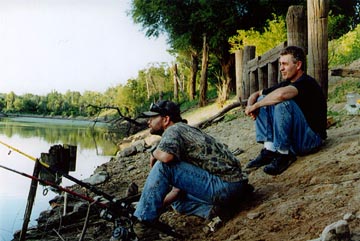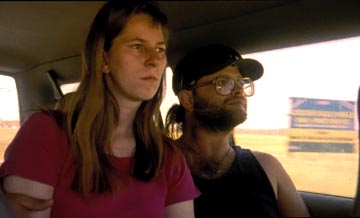Stevie


Stevie may be named after Steve Fielding, but is actually about two people, James and writer/director Steve James. James (Prefontaine) is best known for the wonderful documentary Hoop Dreams, made Stevie out of a sense of curiosity and of atonement. When he was younger, James was a Big Brother to a young Fielding, a troubled kid who seemed to slip through the cracks. He had no father, and seemed to be in the middle of a tug-of-war between his mother Bernice and his step-grandmother Verna. Stevie grew up in a series of foster homes, abused and neglected. James returned to find a troubled adult, and slowly became a part of his life.
What is fascinating about Stevie is both how James loses his objectivity as a filmmaker and how Fielding's life takes a dramatic turn for the worse. Over the course of their reintroduction, James becomes close again to Stevie, and feels a large amount of guilt. He feels that maybe, if he were a better Big Brother or if he kept in touch, Fielding's life would somehow be better. James no longer documents Stevie's life, he is now a part of it. Other obligations cause them to lose touch for a while, and when they reconnect, James finds Stevie accused of molesting his niece. James finds himself wanting to remain objective, but all signs point to Stevie being guilty. His wife Judy's interaction with Stevie changes dramatically after this. She is a counselor who works with sexual predators, and although she feels sympathy towards him, she obviously detests his alleged actions.
The sad part is that even without this charge, Fielding's life was probably going nowhere. He seldom works and needs some serious counseling to overcome some of his issues, especially with his mother. Fielding is extremely stubborn, and refuses any attempts at help, even as the case gets closer to trial and his predicament worsens. His stepsister Brenda helps a lot in caring for him, but their relationship is also tenuous. It's so easy to make fun of these people, and lesser directors probably would. Heck, they live in trailers and embody many stereotypes. By showing these people the way they really are, James is able to look beyond the superficial to reveal some troubled, complex people.
The worse things get, the more the pressure falls upon James. It's as if completing the film will serve as some sort of catharsis. In a way, he is using Fielding for his own purposes, something that Fielding and his relatives are extremely wary about. Even with these doubts, James' subjects are extremely frank and open about their lives, revealing a wealth of personal information to the world. Like Hoop Dreams, James had no idea of how events would play out, and like Hoop Dreams, things go in the direction best suited for film. The last thing James did with Hoop Dreams was to return and film a short "catch-up" film, and hopefully he'll do the same thing here.